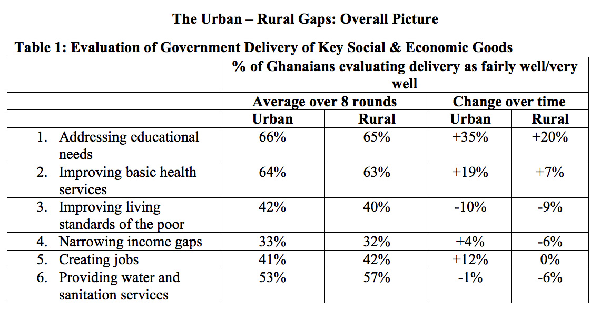
Geographic gaps in dividends of democracy - Insights from Afrobarometer survey
I have grown stronger in my conviction that political systems, democracy being no exception, must deliver critical social and economic goods to citizens.
Over the last couple of weeks, as Ghana hit an important milestone of 30 years of uninterrupted democratic rule, I have had occasion to reflect, first on how good democracy has been for us, and secondly, the current state of the country’s democracy balance sheet.
Advertisement
As we continue to reflect on the past 30 years, and as we begin to look forward to the next 30 and beyond, I turn attention to another critically important matter – gaps in the dividends of democracy. I do so by examining, from a geographic perspective, citizens’ evaluation of how well governments in the fourth republic have addressed 6 key social and economic goods — improving health services, addressing education needs, creating jobs, improving living standards of the poor, providing water and sanitation services, and narrowing income gaps. In my analysis, I focus on the percentage of Ghanaians who evaluate government performance as fairly well/very well, using data from the Afrobarometer survey.
Over time, gaps have emerged in how Ghanaians in the urban areas feel about how well governments have delivered compared to their counterparts in the rural areas. Although both urban and rural areas have seen significant improvements in how well they feel governments in the fourth Republic have addressed their educational needs and improved basic health services, the change over time is much higher in the urban areas than in the rural areas.
Job creation
On job creation, urban areas again show a significant change in their evaluation of government performance over time, whereas the rural areas show no change at all. Urban areas show a slight increase in their evaluation of government performance in narrowing income gaps, while rural areas show a decline. On how well governments have provided water and sanitation services, urban areas report no change over time, but rural areas show a decline. On how well governments have improved the living standards of the poor, both urban and rural areas show a decline in their evaluation with no significant gaps between them.
Pattern of Gaps Over Time
In probing the data further, over the eight rounds of the Afrobarometer survey, the urban-rural gaps manifested in the following ways:
Addressing educational needs — Significant gaps appeared five different times. Rural areas evaluated government performance higher than urban areas twice (1999 and 2014), while urban areas evaluated government performance higher three times (2012, 2017 and 2019).
Improving basic health services — Significant gaps appeared five different times. Rural areas evaluated government performance higher than urban areas twice (1999 and 2014), while urban areas evaluated government performance higher in three rounds (2005, 2017 and 2019).
Improving living standards of the poor — Significant gaps appeared four different times. Rural areas evaluated government performance higher than urban areas once (2014), while urban areas evaluated government performance higher three times (2008, 2017 and 2019).
Narrowing income gaps - Significant gaps appeared four different times. Rural areas evaluated government performance higher than urban areas twice (1999 and 2014), while urban areas evaluated government performance higher three times (2005 and 2017).
Creating jobs - Significant gaps appeared four different times. Rural areas evaluated government performance higher than urban areas twice (1999 and 2014), while urban areas evaluated government performance higher twice (2005 and 2019).
Providing water and sanitation services — Significant gaps appeared five different times. Rural areas evaluated government performance higher than urban areas once (2014), while urban areas evaluated government performance higher four times (2002, 2005, 2017 and 2019).
Dividends
In observing the design and implementation of public policies and programmes in Ghana, I do not walk away with the impression of government selectivity or discrimination. Nonetheless, it is quite instructive the way the patterns reveal themselves, with both urban and rural areas feeling more positive about the dividends of democracy under different ruling governments. It is worth probing why because I am of the strong opinion that the dividends of democracy must be felt equally across all sections of the society.
NB: The writer is a Democracy and Governance Fellow at the Ghana
Centre for Democratic Development (CDD-Ghana.)



